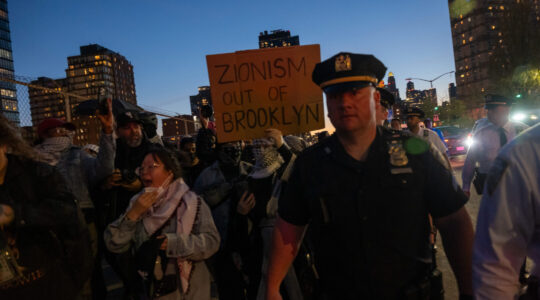After one-month of fighting an inconclusive war against Hezbollah terrorists, Israel’s security cabinet voted Wednesday to launch a broad air, land and sea offensive with the goal of pushing the terrorists beyond the Litani River some 20 miles north of Lebanon’s southern border and to win the “decisive victory” Israeli officials promised at the outset.
Of the 12-member security cabinet, nine reportedly voted in favor of the military action and three abstained. Cabinet minister Eli Yishai was quoted as saying the military offensive would take 30 days to complete. Israel Radio said that as many as 100 to 200 Israeli troops could be killed in such an offensive. It could involve as many as 30,000 Israeli troops.
Gerald Steinberg, a political science professor at Bar-Ilan University, said the security cabinet meeting lasted about seven hours, an indication that there was a “very intense discussion” in which the costs and benefits were weighed.
“This was the least bad alternative,” he said. “There are no guarantees and there is a huge risk involved, but the government decided at this point to take the risk.”
Until that decision, nearly 1,000 Lebanese and more than 100 Israelis were killed in four weeks of fighting triggered by a cross-border raid by Hezbollah terrorists July 12 in which they kidnapped two Israeli soldiers and killed eight others. But even as they announced this long-expected decision, Israel’s political leaders “left the door open for a serious diplomatic proposal,” Steinberg said.
“They have signaled their intentions to put pressure on diplomats, particularly the French, that if there is no reasonable alternative things are going to get worse,” he said. “There is also a renewed chance of a clash with the Syrians. … There was a signal to the diplomats that Israel has lost patience with the diplomatic games and that there is still an opening for a serious proposal because it [the offensive] can always be stopped.”
At a press conference Wednesday — just hours before the security cabinet announced its decision —French President Jacques Chirac voiced hope that a cease-fire could be arranged.
“I can’t imagine that there would be no solution because that would mean, which would be the most immoral result, that we accept the current situation and that we abandon an immediate ceasefire,” he said.
Diplomatic efforts to pass a cease-fire resolution at the United Nations faltered Tuesday. A U.S.-French resolution calling for a “full cessation of violence” between Israel and Hezbollah but allowing Israel the right to respond to Hezbollah attacks unraveled after Arab nations complained it did not call for an immediate halt to the fighting and the withdrawal of Israeli troops from Lebanon. When France agreed to change the resolution, the U.S. balked and no new resolution was immediately agreed upon.
Israel’s ambassador to the UN, Dan Gillerman, told the Security Council Tuesday that the issue was not whether a resolution could be adopted but whether a course of action could be agreed upon that would “end the threat that Hezbollah and its sponsors pose to the people of Israel and Lebanon, and to the region as a whole. … The issue in this crisis is not territory but terror.”
Dore Gold, Israel’s former ambassador to the UN, said shortly before the security cabinet announced its decision that military action could be expected.
“When diplomacy falls apart, Israel has no choice but to pursue a military option to end the Katyushas,” he said of the short-range rockets that have rained down upon northern Israel since the start of the war. As of Wednesday afternoon, Israel said Hezbollah had fired 3,333 rockets at Israel.
“Israel certainly has tried and worked with the American-French resolution rather than attacking it like the Lebanese did,” he said. “The French were trying to be helpful, but many times they try to compete with the U.S. for influence in the Arab world.
”Aaron Miller, a former Middle East adviser to six secretaries of state, voiced skepticism about such a broad military offensive.
“I’m not sure the benefits of such an operation will cancel out the liabilities of continuing in the face of international opposition,” he said. “This conflict will end when both sides are persuaded they have achieved their objective or that they cannot achieve it. … A Security Council resolution will be a pretext or a justification that will allow one or both of them to stand down. If one is passed, it will be with Israeli and Lebanese acquiescence. Then I suspect over the next week or so this conflict will begin to wind down.”
While Israel’s security cabinet met Wednesday, as many as 10,000 Israeli ground troops battled Hezbollah terrorists in fierce fighting in southern Lebanon just one day after a new commander, Maj. Gen. Moshe Kaplinski, was appointed to lead military operations in Lebanon. His appointment was viewed in the Israeli press as a response to public criticism of the war effort.
Shlomo Aronson, director of the Hebrew University’s Center for European Studies, said Olmert “has been under heavy pressure at home to achieve more than he has achieved militarily. He is being criticized for having ordered a half-way war — a compromise between several options that have proven to be inadequate.”
“People expected the Air Force to win the war in the beginning, and then a ground attack with limitations proved difficult and costly,” he said. “As a result, he must achieve more militarily before he accepts any UN offer of any kind. Diplomatically he can sound positive, but he is under pressure to achieve more.”
Aronson said he believes the way to fight this war is for Israeli troops to attack Hezbollah from behind. To do that, they should be dropped in at the mouth of the Litani River — about 16 miles from the Lebanese border — and moved into the Bekaa Valley, he said.
In a speech to Jewish leaders Monday arranged by the United Jewish Communities, the umbrella group for 155 Jewish federations in North America, Olmert described the war as “very difficult” and said it is one being waged by Iran and Syria through their proxy, Hezbollah.
“For the first time in almost the entire life of the State of Israel, not just the soldiers fight, the entire country fights,” he said. “Hundreds of thousands of Israelis are faced on a daily basis with the attacks of rockets and missiles falling on their heads, falling on their houses, destroying the streets of our cities. This is, indeed, a very brutal war. … They want to kill. They want to destroy. They want to help fulfill the promise by the president of Iran that Israel will be wiped off the map.
”Olmert vowed to “win this war,” and added: “It is difficult, and yet everyone comes to me and says don’t stop now, keep on fighting. We will bear this terrible burden …because we don’t want to give these terrorists and those who sponsor these terrorists the opportunity to keep on [with] this destruction and this hatred and this viciousness.”
Even as the security cabinet was meeting Wednesday, Hezbollah terrorists launched more long-range rockets in another failed attempt to strike Israeli cities south of Haifa. Israeli authorities said a Syrian-made Khaibar-1 missile carrying a large amount of explosives landed harmlessly in Haifa; two people were treated for shock.
Until Wednesday, the rockets that had hit Haifa were 220 mm in diameter and carried 16 kg of explosives. The rocket that landed just before noon Wednesday was 302 mm in diameter and carried an estimated 80 to 90 kg of explosives. Israeli authorities had earlier said they believed most of the rocket launchers for the long-range missiles had been destroyed. The two launchers from which Hezbollah launched the Haifa rocket and others that hit the Gilboa area in eastern Israel were later reportedly destroyed by the Israel Air Force.
Diplomats at the UN were also considering last week Monday’s surprise offer by Lebanese Prime Minister Fouad Siniora to deploy 15,000 Lebanese troops in southern Lebanon — backed up by another 2,000 United Nations troops. Although Prime Minister Ehud Olmert said it was worthy of study, it was ultimately rejected as inadequate.
There have been 2,000 UN troops along the Lebanese-Israeli border since 1978 and they have “done absolutely nothing,” pointed out Raphael Israeli, a professor of Islamic Civilization at the Hebrew University of Jerusalem.
“Hezbollah built its positions under the nose of [UN troops],” he said. “How can they disarm them?”I
sraeli also dismissed as “nonsense” the notion that the Lebanese army could be counted on to disarm Hezbollah. He noted that Hezbollah is part of the Lebanese government and that Siniora has promised Hezbollah that it “can continue to operate with a low profile in villages and in the military positions that are now being destroyed by Israel.”
“They will not lift a finger [against Hezbollah] and we will be back to square one within a year,” Israeli warned.
”Israel has insisted that the Lebanese Army be backed up by combat troops from a variety of nations that would be prepared to fight Hezbollah should it try to return to southern Lebanon.Haim Malka, a senior fellow at the Center for Strategic and International Studies in Washington, said the offer to put Lebanese troops on the border is a “first step” but one that is “not going to end the violence and prevent Hezbollah from launching future attacks.”
“The question is whether the Lebanese military is willing to stop future attacks, and the answer is no because it is too weak to confront Hezbollah,” he said. “Just because you have a deployment of Lebanese troops in the area does not mean that Hezbollah is going to leave and lay down its arms. … It’s not realistic but it’s an important step for Lebanon to attempt at least to exert its authority throughout the entire country. It could be a step in the process of implementing resolution 1559 [which calls for Hezbollah‘s disarming], but that is going to take years.”
Malka pointed out that nearly 30 percent of Lebanon’s army consists of Shiites — the same ethnic group that formed Hezbollah — and that they therefore could be expected to “have loyalties” to Hezbollah.
Gold, the former ambassador to the U.N., said the removal of Hezbollah from south of the Litani River would “make it easier for multinational forces” to aid the Lebanese Army in keeping Hezbollah from returning to the south.
“Anyone who expected international forces to come into southern Lebanon [while Hezbollah was still there] is dreaming,” he said.
The New York Jewish Week brings you the stories behind the headlines, keeping you connected to Jewish life in New York. Help sustain the reporting you trust by donating today.




